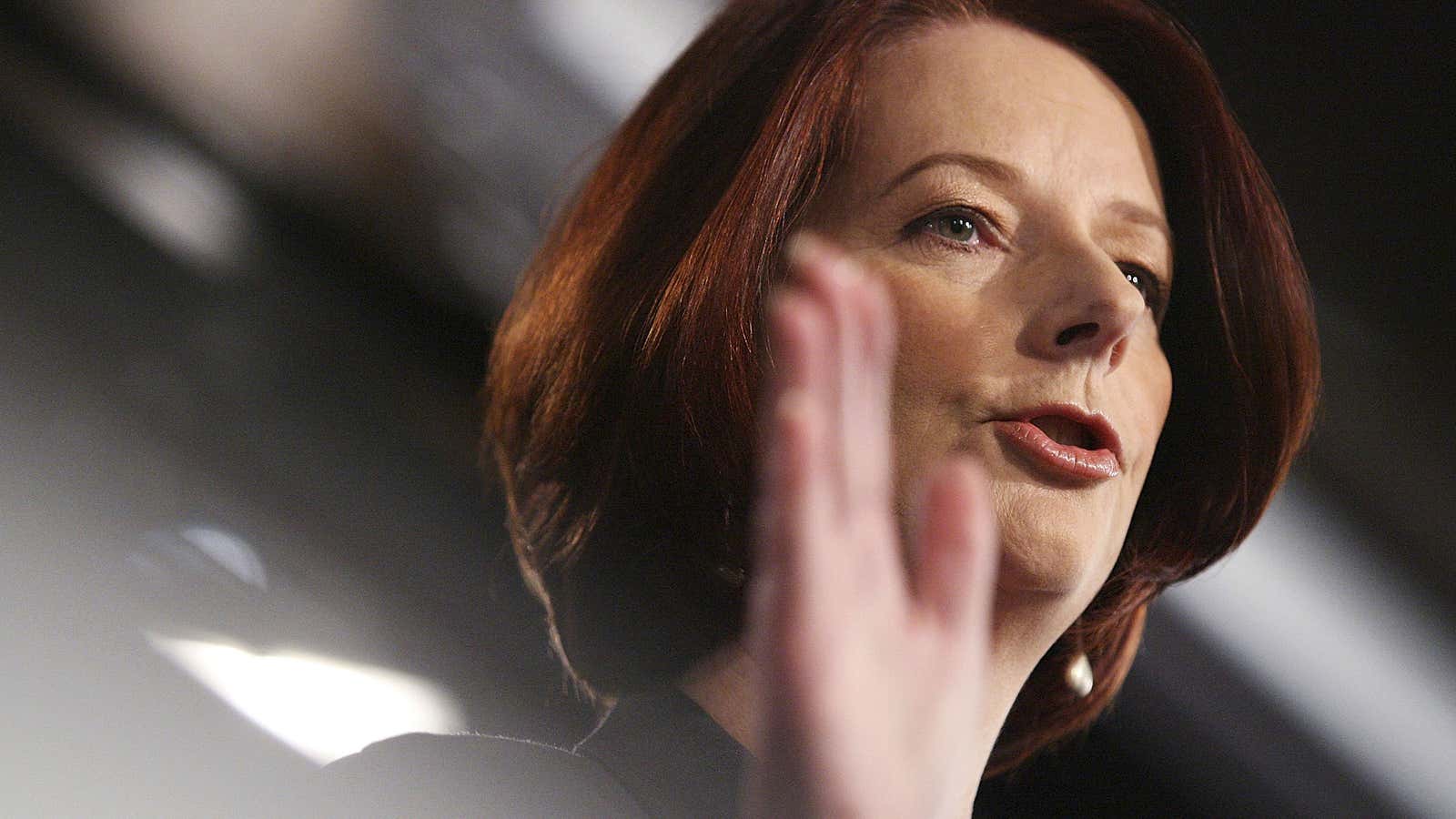We are witnessing a tipping point in global gender politics when a feisty female prime minister can aggressively call out her male opponent as a sexist and misogynist, immediately become an international online sensation, then surge to a 10-point poll lead.
Australia’s Julia Gillard has enjoyed a popularity boost and seems to have almost started a mini-cultural revolution with her electrifying J’accuse speech in the Federal Parliament repudiating the “repulsive double standards” of her rival Tony Abbott and the “vile conduct” of his conservative party. (Gillard must announce an election to be held before November 2013, and Abbott is her likely opponent.)
In less than two weeks since the Labor leader’s crackling oration—informing the Opposition leader to go look in the mirror if he wanted to know what misogynist meant—the speech has been viewed more than 2 million times on YouTube. The online community worldwide is lapping up the thrilling cold white fury of a very smart woman once too often scorned by her cynical opponent. And so are Australians, with everyone from men to the country’s dictionary now actually peering at themselves in the looking glass.
In the Oct. 9 diatribe, the nation’s first-ever female prime minister, who happens to be unmarried and childless, attacked Abbott for standing next to political placards saying “ditch the witch” and “man’s bitch.” Yes, those referred to her. Other offenses to the sisterhood included Abbott catcalling Gillard across the chamber to “make an honest woman” of herself.
“I was offended by those things. Misogyny, sexism, every day from this leader of the opposition,” the prime minister intoned as she demanded, steely-eyed that he “apologize to the women of Australia” (or the “housewives of Australia…as they do the ironing,” as the Opposition leader had labeled them, Gillard noted).
As political commentator George Megalogenis, writing in The Australian newspaper put it: “Every man would recognise the flicker of panic in Abbott’s eyes, when he switches from blokey guffaw to ‘hang on, she might have a point.’ This is the son being told off by the mother, the partner being given the ultimatum.”
Instead of deepening her political woes as predicted by most mainstream media pundits, Gillard’s impassioned, gloves-off intervention, now destined to go down globally as a classic in the history of great political speeches, was like a crash of thunder on social media forums like Facebook and Twitter. Simultaneously, it delivered a rebound in her fortunes.
If international media attention and headlines about Gillard’s misogyny speech are any sign, a movement for change, outing sexism in public life, is spreading way beyond the great southern land. It all seems to be thanks to the politics-without-borders nature of social media.
The political earthquake is equally high on the Richter scale in Australia, where Gillard, who heads up a minority center-left government, was staring down internal dissent and opposition attacks after the imposition of a controversial carbon tax threatened her grip on the leadership.
Her startling speech has been a stunning game-changer, resonating immediately with female voters in Australia, who have flocked to the previously embattled PM’s side in a new survey. Fascinatingly, the redheaded Labor Party leader, who has the presence of (and a passing physical resemblance to) actress Jodie Foster, has also won back male support. She is now the preferred prime minister among both men and women.
The Australian Macquarie Dictionary quickly responded, amending its definition of misogyny to include “entrenched prejudice of women” in addition to the usual “hatred of women.”
The Gillard saga is a wonderful story of one of the oldest of democratic debating forums—the parliament—unintentionally joining forces with social media to redefine the political and cultural agenda. All this has occurred largely over the top of the old “mainstream media.” Aging Australian babyboomer commentators have been left with egg on their faces after they scoffed at Gillard’s speech as a distraction that would flop with voters. In fact, the opposite has occurred, upending the male-determined rules of politics as we know it.
Rising above the sordid daily political fray, Gillard cut through the static by abandoning caution and showing her true strengths as a leader of unmistakable passion, awesome debating skills, and the kind of controlled righteous anger that can only instill respect.
As an Australian commentator on public affairs, I was also skeptical about the merits of feminists paying so much attention to the travails of privileged women of influence such as Gillard. So many other women in the world suffer from the most abject forms of violence and discrimination.
Malala Yousafzai, the Pakistani teen gunned down by the Taliban for wanting to go to school, patently deserves a lot more attention and activism than the prime minister of a rich, middle-ranking power. But Gillard’s call to arms has gone down well even in developing countries like India, where she was on an official visit last week. Everywhere she went the prime minister was asked about her speech, in very approving terms.
No doubt politicians around the world are taking note of Gillard’s success.
US President Barack Obama obviously cannot make the same complaints as the Australian prime minister, but he should study the Australian case as he attempts to get out the female vote, overwhelmingly in his favor, ahead of the election. If he goes as tough, with the right tone and passion, he could close his problematic gender gap in tonight’s final debate, impressing men just as much as women—as Gillard has proven possible.
Facing the fight of her political life, and increasingly suffering as her opponent played the gender card, Gillard appears to have triumphed by imitating the spirit of the hit song “The Power and the Passion,” by Australian 1980s band Midnight Oil (whose former lead singer Peter Garrett now sits in Parliament on Gillard’s side of the chamber). It goes like this:
“Oh The Power and the Passion/Sometimes you’ve got the take the hardest line.”
Now there’s a political lesson worth heeding for national leaders in strife (hint, hint, Mr. Obama).
